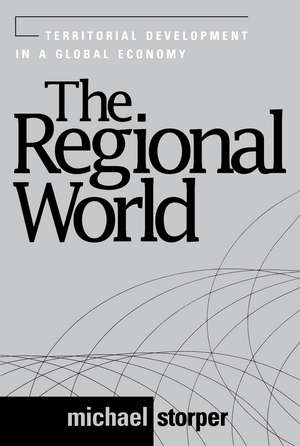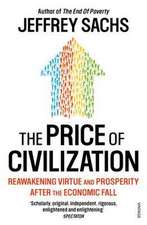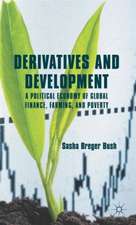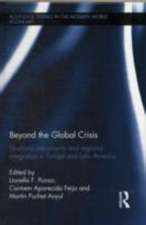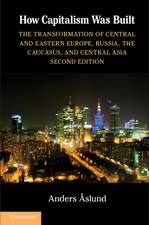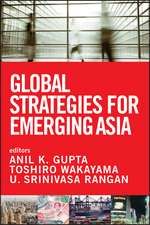The Regional World: Territorial Development in a Global Economy: Perspectives on Economic Change
Autor Michael Storperen Limba Engleză Paperback – 23 dec 1997
Preț: 350.62 lei
Nou
Puncte Express: 526
Preț estimativ în valută:
67.09€ • 70.23$ • 55.84£
67.09€ • 70.23$ • 55.84£
Carte tipărită la comandă
Livrare economică 31 martie-14 aprilie
Preluare comenzi: 021 569.72.76
Specificații
ISBN-13: 9781572303157
ISBN-10: 1572303158
Pagini: 338
Ilustrații: black & white illustrations
Dimensiuni: 152 x 229 x 23 mm
Greutate: 0.54 kg
Ediția:New.
Editura: Guilford Publications
Colecția Guilford Press
Seria Perspectives on Economic Change
ISBN-10: 1572303158
Pagini: 338
Ilustrații: black & white illustrations
Dimensiuni: 152 x 229 x 23 mm
Greutate: 0.54 kg
Ediția:New.
Editura: Guilford Publications
Colecția Guilford Press
Seria Perspectives on Economic Change
Public țintă
Professional Practice & Development and UndergraduateCuprins
THE REGIONAL WORLD
I. Regions as Relations and Conventions
1. The Resurgence of Regional Economies, Ten Years Later
2. Regional Economies as Relational Assets
II. Evolution and Territorial Development
3. The Evolution of Regional Specificities
4. Crossing Industrial Divides in a Region
III. Products, Technologies, and Territories
5. Innovation as Collective Action: Conventions, Products, Technologies, and Territories
6. Regional Worlds of Production: Conventions of Learning and Innovation in the Technology Districts of France, Italy, and the United States
IV. Globalization and Territorial Specificity
7. Territories, Flows, and Hierarchies in the Clobal Economy
8. The Limits to Globalization: Technology Districts and International Trade
9. The World of the City: Local Relations in a Global Economy
V. Regional Institutions, Territorial Orders
10. Institutions of the Learning Economy
11. Conclusion: Technology, Firm Strategies, and Territorial Order
I. Regions as Relations and Conventions
1. The Resurgence of Regional Economies, Ten Years Later
2. Regional Economies as Relational Assets
II. Evolution and Territorial Development
3. The Evolution of Regional Specificities
4. Crossing Industrial Divides in a Region
III. Products, Technologies, and Territories
5. Innovation as Collective Action: Conventions, Products, Technologies, and Territories
6. Regional Worlds of Production: Conventions of Learning and Innovation in the Technology Districts of France, Italy, and the United States
IV. Globalization and Territorial Specificity
7. Territories, Flows, and Hierarchies in the Clobal Economy
8. The Limits to Globalization: Technology Districts and International Trade
9. The World of the City: Local Relations in a Global Economy
V. Regional Institutions, Territorial Orders
10. Institutions of the Learning Economy
11. Conclusion: Technology, Firm Strategies, and Territorial Order
Notă biografică
Michael Storper is Professor of Regional and International Development in the School of Public Policy and Social Research at the University of California, Los Angeles, and Professor in Social and Human Sciences at the University of Marne-la-Vallée, France.
Recenzii
A major contribution to both regional science and modern social science. This book treats in an integrated way the major themes of regional economics: industrial districts, urbanization, and globalization. The approach is interdisciplinary, and the author succeeds in bringing together in his own original theoretical framework major elements from the most up-to-date theoretical debates in economics and sociology....The book will certainly become a classic among regional economists, and it has much to offer to anyone interested in what is going on in the social sciences in our time. --Bengt-Aake Lundvall, Department of Business Studies, Aalborg University, Denmark
This is a path-breaking book written by one of our most prominent economic geographers. It offers a novel and compelling theorization of why regions continue to matter in a global age. In conceptualizing the region, inter alia, as a nexus of untraded interdependencies, Michael Storper forces recognition of the decisive influence upon economic competitiveness, innovation and adaptability, of the social relations of proximity such as sedimented actor rationalities, local knowledge and learning environments, social and cultural conventions, and industrial and institutional legacies. His approach considerably advances regional theory beyond the recent rediscovery of external economies of agglomeration within economics. It paves the way for a new institutionalist and evolutionary paradigm in regional development studies. --Ash Amin, Professor of Geography, University of Durham, UK
-This is a path-breaking book written by one of our most prominent economic geographers. It offers a novel and compelling theorization of why regions continue to matter in a global age. In conceptualizing the region, inter alia, as a nexus of untraded interdependencies, Michael Storper forces recognition of the decisive influence upon economic competitiveness, innovation and adaptability, of the social relations of proximity such as sedimented actor rationalities, local knowledge and learning environments, social and cultural conventions, and industrial and institutional legacies. His approach considerably advances regional theory beyond the recent rediscovery of external economies of agglomeration within economics. It paves the way for a new institutionalist and evolutionary paradigm in regional development studies. --Ash Amin, Professor of Geography, University of Durham, UK
Descriere
This work proposes a theory of how regions have sustained their economic viability in an era of multinational corporations.
